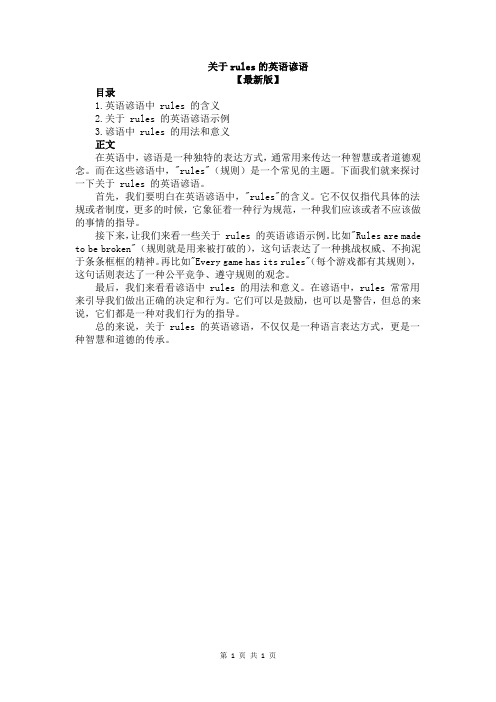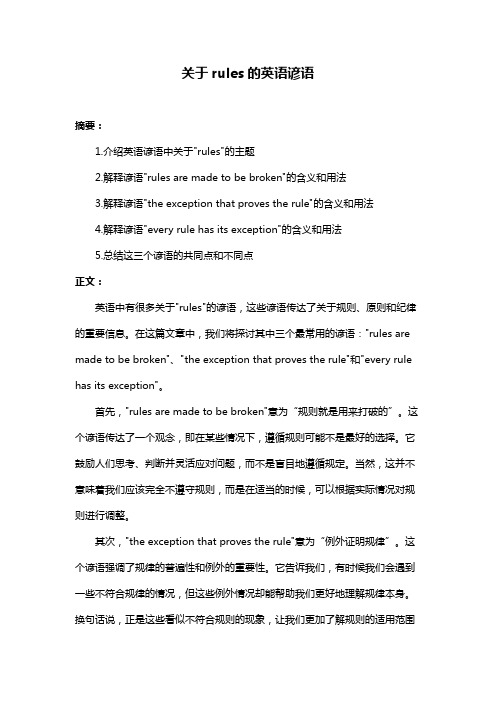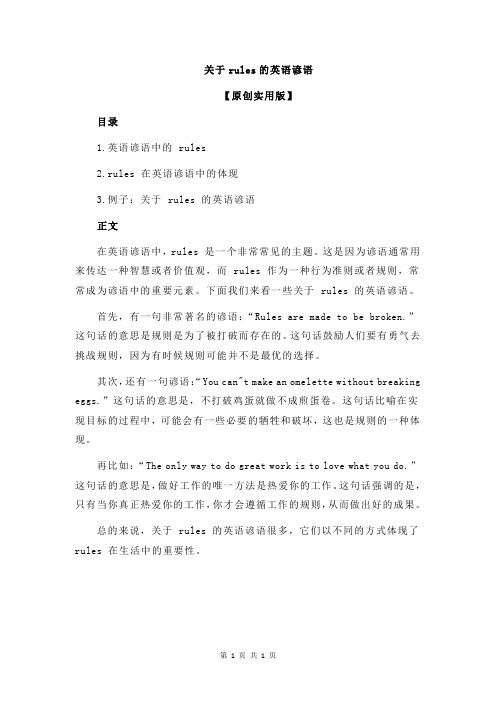跟规则有关的英语谚语
关于rules的英语谚语

关于rules的英语谚语
【最新版】
目录
1.英语谚语中 rules 的含义
2.关于 rules 的英语谚语示例
3.谚语中 rules 的用法和意义
正文
在英语中,谚语是一种独特的表达方式,通常用来传达一种智慧或者道德观念。
而在这些谚语中,"rules"(规则)是一个常见的主题。
下面我们就来探讨一下关于 rules 的英语谚语。
首先,我们要明白在英语谚语中,"rules"的含义。
它不仅仅指代具体的法规或者制度,更多的时候,它象征着一种行为规范,一种我们应该或者不应该做的事情的指导。
接下来,让我们来看一些关于 rules 的英语谚语示例。
比如"Rules are made to be broken"(规则就是用来被打破的),这句话表达了一种挑战权威、不拘泥于条条框框的精神。
再比如"Every game has its rules"(每个游戏都有其规则),这句话则表达了一种公平竞争、遵守规则的观念。
最后,我们来看看谚语中 rules 的用法和意义。
在谚语中,rules 常常用来引导我们做出正确的决定和行为。
它们可以是鼓励,也可以是警告,但总的来说,它们都是一种对我们行为的指导。
总的来说,关于 rules 的英语谚语,不仅仅是一种语言表达方式,更是一种智慧和道德的传承。
第1页共1页。
关于规则的英文谚语

关于规则的英文谚语关于规则的英文谚语导读:本文是关于关于规则的英文谚语,如果觉得很不错,欢迎点评和分享!1、细水长流成河,粒米积蓄成箩。
Thin water flows into rivers, and grain accumulates into baskets.2、有理走遍天下,无理寸步难行。
Reasonable walking all over the world, unreasonable step is difficult.3、无事田中走,谷米长几斗。
Walking in the field without any problem, the rice is several buckets long.4、一家不知一家,和尚不知道家。
A monk does not know his family.5、只勤不俭无底洞,只俭不勤水无源。
Only diligence, no thrift, no bottomless pit, only thrift, no diligence, no water, no source.6、有事叫公公,无事脸朝东。
Something is called Gong Gong, nothing faces east.7、只要肯劳动,一世不会穷。
As long as you are willing to work, you will never be poor.8、鱼生火,肉生痰,青菜豆腐保平安。
Fish makes fire, meat makes phlegm, green vegetable tofu keeps safety.9、治病要早,除祸要狠。
Treat the disease early and cure the disaster severely.10、一叶遮目,不见泰山。
One leaf shades the eyes, but Mount Tai is not visible.11、讨饭怕狗咬,秀才怕岁考。
关于rules的英语谚语

关于rules的英语谚语【原创实用版】目录1.英语谚语中的规则(rules)2.规则在英语谚语中的体现3.几个关于规则的英语谚语举例正文在英语谚语中,规则(rules)是一个常见的主题。
谚语是民间智慧的结晶,通常用来传达一种道理或者规律,帮助人们在生活中做出正确的决策。
规则在谚语中往往起到指导和规范的作用,让人们明白应该遵循什么样的行为准则。
在英语谚语中,规则有很多体现。
比如,有一句谚语是“No rules are made to be broken”,意思是没有规矩不成方圆,强调了遵循规则的重要性。
还有一句谚语是“Rules are made to be broken”,意思是规则是为了被打破而存在的,这句谚语则表达了一种挑战权威、追求创新的精神。
以下是几个关于规则的英语谚语举例:1.“The only way to do great work is to love what you do.”这句谚语意味着,想要做出伟大的成就,你需要热爱你所从事的事情。
这里,热爱就是你遵循的规则,只有心怀热爱,才能在事业上取得成功。
2.“If you want to go fast, go alone.If you want to go far, go together.”这句谚语告诉我们,如果你想走得快,可以独自前行;但如果你想走得更远,需要与他人携手合作。
这里,合作就是遵循的规则,它帮助你在人生道路上行稳致远。
3.“Success is not final, failure is not fatal: it is the courage to continue that counts.”这句谚语鼓励我们要有毅力,不放弃。
成功并非一蹴而就,失败也不意味着终结,关键在于勇敢地面对挫折,坚持不懈地努力。
在这种情况下,勇敢和坚持就是遵循的规则。
总之,关于规则的英语谚语为我们提供了许多有益的指导,让我们明白在生活中应该遵循什么样的行为准则。
关于rules的英语谚语

关于rules的英语谚语摘要:1.介绍英语谚语中关于"rules"的主题2.解释谚语"rules are made to be broken"的含义和用法3.解释谚语"the exception that proves the rule"的含义和用法4.解释谚语"every rule has its exception"的含义和用法5.总结这三个谚语的共同点和不同点正文:英语中有很多关于"rules"的谚语,这些谚语传达了关于规则、原则和纪律的重要信息。
在这篇文章中,我们将探讨其中三个最常用的谚语:"rules are made to be broken"、"the exception that proves the rule"和"every rule has its exception"。
首先,"rules are made to be broken"意为“规则就是用来打破的”。
这个谚语传达了一个观念,即在某些情况下,遵循规则可能不是最好的选择。
它鼓励人们思考、判断并灵活应对问题,而不是盲目地遵循规定。
当然,这并不意味着我们应该完全不遵守规则,而是在适当的时候,可以根据实际情况对规则进行调整。
其次,"the exception that proves the rule"意为“例外证明规律”。
这个谚语强调了规律的普遍性和例外的重要性。
它告诉我们,有时候我们会遇到一些不符合规律的情况,但这些例外情况却能帮助我们更好地理解规律本身。
换句话说,正是这些看似不符合规则的现象,让我们更加了解规则的适用范围和限制。
最后,"every rule has its exception"意为“每个规则都有例外”。
关于rules的英语谚语

关于rules的英语谚语
【原创实用版】
目录
1.英语谚语中的 rules
2.rules 在英语谚语中的体现
3.例子:关于 rules 的英语谚语
正文
在英语谚语中,rules 是一个非常常见的主题。
这是因为谚语通常用来传达一种智慧或者价值观,而 rules 作为一种行为准则或者规则,常常成为谚语中的重要元素。
下面我们来看一些关于 rules 的英语谚语。
首先,有一句非常著名的谚语:“Rules are made to be broken.”这句话的意思是规则是为了被打破而存在的。
这句话鼓励人们要有勇气去挑战规则,因为有时候规则可能并不是最优的选择。
其次,还有一句谚语:“You can"t make an omelette without breaking eggs.”这句话的意思是,不打破鸡蛋就做不成煎蛋卷。
这句话比喻在实现目标的过程中,可能会有一些必要的牺牲和破坏,这也是规则的一种体现。
再比如:“The only way to do great work is to love what you do.”这句话的意思是,做好工作的唯一方法是热爱你的工作。
这句话强调的是,只有当你真正热爱你的工作,你才会遵循工作的规则,从而做出好的成果。
总的来说,关于 rules 的英语谚语很多,它们以不同的方式体现了rules 在生活中的重要性。
第1页共1页。
常理与法则的英文谚语

常理与法则的英文谚语常理与法则的英文谚语1. A good beginning is half done.良好的开端是成功的一半。
2. Don’t put off till tomorrow what shouldbe done today.今日事,今日毕。
3. Fact speak louder than words.事实胜于雄辩。
4. Failure is the mother of success.失败是成功之母。
5. A bird in the hand is worth than two inthe bush.一鸟在手胜过双鸟在林。
6. Seeing is believing.眼见为实。
7. Still water run deep.静水流深。
8. Strike the iron while it is hot.趁热打铁。
9. When in Rome, do as the Romans do.入乡随俗。
10. Man proposes, god disposes.谋事在人,成事在天。
11. Look before you leap.摸清情况再行动。
12. Experience must be bought.吃一堑,长一智。
13. Make hay while the sun shines.良机勿失。
14. He who does not advance loses ground.逆水行舟,不进则退。
15. Easier said than done.说得容易,做得难。
16. Every day is not Sunday.好景不常在。
17. All that glitters is not gold.闪光的`不一定都是金子。
18. All things are difficult before theyare easy.凡事总是由难而易。
19. Every advantage has its disadvantage.有利必有弊。
关于rules的英语谚语

关于rules的英语谚语【原创版】目录1.英语谚语中关于 rules 的含义2.规则在英语谚语中的重要性3.几个典型的关于 rules 的英语谚语介绍4.总结:谚语中关于 rules 的启示正文在英语中,规则扮演着非常重要的角色,这一点从大量的英语谚语中便可见一斑。
在这篇文章中,我们将探讨一些关于 rules 的英语谚语,并从中汲取一些启示。
首先,关于 rules 的英语谚语通常强调规则的重要性。
在英语中,有这样一句谚语:“Rules are made to be broken”,意思是规则就是用来被打破的。
这句话暗示了人们需要有勇气去挑战规则,因为有时候规则并不是一成不变的。
然而,这并不意味着我们可以完全无视规则,而是要在适当的时候,以合理的方式去调整和改变规则。
另一个关于 rules 的英语谚语是:“You can"t make an omelette without breaking eggs”,这句话的意思是,不打破鸡蛋就无法做出煎蛋卷。
虽然这句话的字面意思与规则无关,但它暗喻了为了达到某个目标,我们可能需要改变一些既有的规则或习惯。
再者,还有一句关于 rules 的谚语:“Every rule has its exception”,意思是每个规则都有其例外。
这句话提醒我们,在一些特殊情况下,我们需要灵活变通,不必死守规则。
通过以上几个典型的关于 rules 的英语谚语,我们可以看出,规则在英语文化中占有重要地位。
然而,这些谚语也提醒我们,在遵循规则的同时,也要学会灵活变通,适当地打破规则,以便更好地适应变化的环境和达成目标。
遵守规章制度的英语谚语

遵守规章制度的英语谚语In English, there are countless proverbs that stress the value of following rules and regulations. These sayings have been passed down through generations and continue to resonate with people today. Let's explore some of these proverbs and delve into the meaning behind them.1. "Rules are made to be followed."This proverb highlights the fact that rules are put in place for a reason and should be adhered to. By following rules, we ensure order and prevent chaos from taking over. Whether it's traffic laws, workplace policies, or social etiquette, rules serve as guidelines for appropriate behavior.2. "Better to ask for forgiveness than permission."While this proverb may seem to contradict the importance of following rules, it actually emphasizes the value of taking initiative and being proactive. Sometimes, in order to achieve a goal or make a positive change, we may need to bend the rules slightly. In such cases, it is better to act first and seek forgiveness later than to be paralyzed by indecision.3. "Obey the law and the law will protect you."This proverb underscores the notion that by obeying the law, we ensure our own safety and security. Laws are put in place to safeguard individuals and uphold justice. By following the rules, we contribute to a peaceful and just society where everyone's rights are respected.4. "Play by the rules."Playing by the rules means competing fairly and adhering to the established guidelines of a game or competition. This proverb emphasizes the importance of honesty and integrity in all our endeavors. When we play by the rules, we ensure a level playing field and uphold the integrity of the activity.5. "Rules are not made to be broken."Contrary to the popular saying "rules are made to be broken," this proverb asserts that rules should be respected and followed. Breaking rules can lead to negative consequences and disrupt the harmony of a group or society. By respecting the rules, we demonstrate our commitment to order and stability.6. "Follow the guidelines to success."Success often requires adhering to certain guidelines and rules. Whether in academics, career, or personal goals, following the established guidelines can help us achieve our desired outcome. This proverb encourages us to stay focused and disciplined in order to reach our full potential.7. "Sow lawlessness, reap disorder."This proverb warns of the consequences of disregarding rules and regulations. When we ignore the established norms of society, we create chaos and disorder. By sowing lawlessness, we inevitably reap the negative outcomes of our actions. This proverb serves as a reminder of the importance of abiding by the rules.8. "Respect the code of conduct."A code of conduct is a set of guidelines that governs behavior in a particular setting or organization. This proverb encourages us to respect and abide by the code of conduct in order to maintain order and professionalism. By following the rules set forth in the code, we uphold the values and standards of the group.9. "Adhere to the protocol."Protocol refers to the established rules and procedures for a given situation or event. This proverb emphasizes the importance of following the protocol in order to ensure smooth and efficient operations. By adhering to the protocol, we demonstrate respect for the process and contribute to the overall success of the endeavor.10. "Rules are the foundation of society."Society is built upon a foundation of rules and regulations that govern behavior and interactions. This proverb highlights the crucial role that rules play in maintaining order and stability in a community. By respecting and following the rules, we contribute to the strength and cohesion of society as a whole.In conclusion, these proverbs and sayings serve as reminders of the importance of following rules and regulations in our daily lives. By adhering to established norms and guidelines, we contribute to a harmonious and orderly society. Whether it's obeying traffic laws, respecting workplace policies, or adhering to social etiquette, following rules is essential for the well-being of individuals and the community as a whole. So, let us take these wise words to heart and strive to live by them in our everyday actions.。
- 1、下载文档前请自行甄别文档内容的完整性,平台不提供额外的编辑、内容补充、找答案等附加服务。
- 2、"仅部分预览"的文档,不可在线预览部分如存在完整性等问题,可反馈申请退款(可完整预览的文档不适用该条件!)。
- 3、如文档侵犯您的权益,请联系客服反馈,我们会尽快为您处理(人工客服工作时间:9:00-18:30)。
跟规则有关的英语谚语导读:1、一夜不宿,十夜不足。
One night is not enough, ten nights are not enough.2、早起三光,晚起三慌。
Get up early three lights, get up late three panic.3、只要肯劳动,一世不会穷。
As long as you are willing to work, you will never be poor.4、一日不读口生,一日不写手生。
One day no oral students, one day no handwritten students.5、无事嫌夜长,有事嫌日短。
No matter how long the night is, no matter how short the day is.6、虚心的人学十当一,骄傲的人学一当十。
A modest man should learn ten, a proud man ten.7、药对方,一口汤;不对方,一水缸。
The other side, a soup; the other side, a water tank.8、在家千日易,出门一时难。
It is easy to stay at home for thousands of days, but difficult to go out for a while.9、小时偷针,大了偷金。
Stealing needles in an hour is bigger than stealing gold.10、顺着鸡毛找鸡,顺着蒜皮找蒜。
Look for chicken along feathers, garlic along skins.11、小伤风三日,大伤风七天。
Small cold for three days and big cold for seven days.12、有多大的脚,穿多大的鞋。
How big feet, how big shoes to wear.13、贪得一时嘴,受了一身累。
Greedy for a while, tired.14、越坐人越懒,越吃口越馋。
The lazier you sit, the more you eat.15、只勤不俭无底洞,只俭不勤水无源。
Only diligence, no thrift, no bottomless pit, only thrift, no diligence, no water, no source.16、天无一月雨,人无一世穷。
There is no rain in January, and no man is poor forever.17、在家不理人,出外没人理。
No one at home, no one outside.18、只要功夫深,铁杵磨成针。
As long as the work is deep, the pestle is ground into a needle.19、子不嫌母丑,狗不嫌家贫。
Dogs don't dislike their mother's ugliness or their family's poverty.20、秀才遇到兵,有理说不清。
Xiu Cai met soldiers, there is no reason to say.21、学问勤中得,富裕俭中来。
Academic diligence leads to wealth and thrift.22、学好三年,学坏三天。
Learn well for three years, learn badly for three days.23、嘴上无毛,办事不牢。
The mouth is hairless and the work is not firm.24、早起动动腰,一天少疲老。
Start early and start your waist. You are young and tired all day.25、钥匙不能劈柴,斧子不能开锁。
Keys can't split wood, axes can't unlock.26、先钉桩子后系驴,先撒窝子后钓鱼。
First nail the stake, then tie the donkey, first scatter the nest and then fish.27、一回经蛇咬,三年怕草绳。
Once bitten by a snake, three years afraid of straw rope.28、种早不荒,起早不忙。
Sowing early is not a waste, getting up early is not busy.29、歇肩莫歇长,走路莫走忙。
Don't walk busily.30、土中生白玉,地内出黄金。
White jade grows in the earth, and gold comes out in the earth.31、小人自大,小溪声大。
Small people are arrogant and small streams are loud.32、无风不起浪,无鱼水不深。
No wind, no waves, no fish, no deep water.33、用人不疑,疑人不用。
No doubt about the employer, no doubt about the suspect.34、在朝都是官,在席都是客。
In dynasty, all officials are present and all guests are present.35、听话听音,看人看心。
Listen, listen and watch.36、只有上不去的天,没有过不去的山。
There are no mountains that can't be crossed except those that can't be crossed.37、铁冷了打不得,话冷了说不得。
The iron is too cold to fight and the words too cold tospeak.38、有心烧香,不论早晚。
Heart burns incense, no matter sooner or later.39、要得惊人艺,须下苦功夫。
It takes a lot of hard work to be amazing.40、有粮当思无粮难,莫到无粮思有粮。
When there is grain, it is difficult to think of it without food.41、有多大本钱,做多大生意。
How much money do you have and how much business do you do?42、行船趁顺风,打铁趁火红。
Shipping takes advantage of the wind and iron takes advantage of the fire.43、一家不知一家,和尚不知道家。
A monk does not know his family.44、庄稼不让时,船家不让风。
When the crops refuse, the boatman refuses to let the wind blow.45、一羽示风向。
一草示水流。
A feather shows the direction of the wind. A grass shows the current.46、只给君子看门,不给小人当家。
Only for gentlemen, not for villains.47、有上坡必有下坡,有进路必有出路。
Where there is an uphill, there is a downhill. Where there is an approach, there is a way out.48、送君千里,终须一别。
Send you a thousand miles, you have to be different.49、痒要自己抓,好要别人夸。
The itch should be caught by oneself, so that others can praise it.50、走路不怕上高山,撑船不怕过限滩。
Walking is not afraid of climbing mountains, and pooling is not afraid of over-limited beaches.51、一天省下一两粮,十年要用仓来装。
Save one or two grains a day and store them in warehouses for ten years.52、庄稼一枝花,全靠肥当家。
A single flower of a crop depends entirely on fertility.53、一顿吃伤,十顿吃汤。
One meal hurts, ten meals soup.54、由俭入奢易,由奢入俭难。
From thrift to luxury is easy, from luxury to frugality isdifficult.55、冤各有头,债各有主。
Every injustice has its own head and every debt has its own owner.56、只要苦干,事成一半。
As long as you work hard, you'll get half done.57、一日三笑,不用吃药。
Laugh three times a day without taking medicine.。
